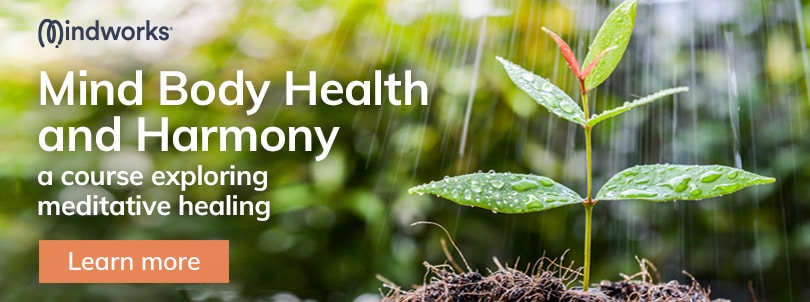Physical health and the mind-body connection
Category: Health and Meditation | Meditation and the Brain | Mind Trainer Articles | Stress and Anxiety

What is the mind-body connection?
The term “mind-body connection” refers to the understanding that our physical health involves more than just the body. Mind is what connects us and our physical body to the rest of the world. Mind connects us to our thoughts, attitudes, and emotions, as well as to our actions and behavior. It also connects us to the people around us in relationship.
Because I’m a cardiologist, when I talk about the mind-body connection I focus on the heart. This is the physical heart—the mechanics, blood vessels, circulation, and so on—as well as the emotional heart. The emotional heart connects us to ourselves in terms of feelings of self-compassion, self-love, or self-loathing, for example. It connects us to the universe and the world around us and to others in terms of personal relationships. And then there’s the spiritual or metaphysical heart, the heart that connects us to infinite wisdom or a universal presence. The heart is the combination of all of these things.
The mind-body connection is the recognition that when we talk about physical health or physical illness, we can’t just limit ourselves to the physical disease condition. We need to understand that our emotions, our thoughts, our behavior, and how we interpret the world around us matters.
How does the body carry these emotional messages to affect your health?
The term emotion really translates as energy in motion. An emotion is an expression of our deep inner thoughts. Thoughts and words are often conscious expressions. Emotions, on the other hand, are the gateway to the unconscious. There are thoughts and attitudes that aren’t present in our conscious awareness, but our emotions somehow betray them.
People tend to think that their emotions are shallow, in the sense that they aren’t solid. They think that they’re angry or in love or whatever that energetic motion might be for that moment, whether it’s on the positive end of love and gratitude—the highest vibrational, emotional energy—or the low end of anger, hatred, or jealousy. I think, however, that it is really important for people to understand that emotions have a direct cellular effect on the body.
I like to say that our thoughts and emotions lead to this cascade where there are literally hundreds of thousands of neurotransmitters; these are chemical messengers, chemical molecules. It’s like a big orchestra where you can see the movement of the symphony. Are your emotions playing a really sweet, calming melody, or are they playing heavy metal? Imagery such as this can help patients understand that when they have persistent negative thoughts and emotions, these can potentially wreak a lot of havoc on the body. Likewise, positive thoughts and emotions are linked to a good many health benefits. The latest research on the mind-body connection confirms this.
How do we find our center and gently take agency over our mind-body health?
Oftentimes when patients come to see me, they feel that they lack control, as if they are on a runaway train, whether it is control of their life as a whole, their family, their work, or their physical health. It is so important to give patients back that control, to give them the knowledge that they are the agents that control their lives and to give them the tools to do it. I’ve seen real transformation in patients who recognize that they can self-direct their lives because then they can take action and amazing things can happen.
My patients span the gamut from people who may be less educated to high-power executives who appear to be completely in control, and yet they feel that they are not. Their sense is that their job is running them, the money is running them, finances are running them, the board is running them. And to be honest with you, those execs are some of the hardest patients to shift in terms of their ability to let go and make adjustments to their lifestyles.
When we talk about health and healing, I always tell patients that the ability to let go—of self-loathing, of judgment, of what we expect of ourselves and others—just letting go is crucial to healing. And anyone who truly lets go feels an incredible sense of relief. It’s like an aha moment for them to acknowledge that, “I can do this. I can choose to let go. I can choose to not allow all these things that seemingly rule my life to have such a huge impact on me.” It’s a mind shift, and it can happen in an instant. And that’s the true transformation: the recognition and the decision to just be, to let go, to forgive. To forgive oneself and forgive others.
It seems to me that this is a necessary ingredient of healing. Take patients who have high blood pressure that’s difficult to control; they may be on three, four, or five different medications. Control is always an innate part of their physiology, an innate part of that mind-body interplay. It doesn’t matter how much biochemistry, how much pharmacology you throw at those patients unless they acquire the self-awareness that allows them to let go of that control, to just let it all go. And when they do, you can feel the cellular relief, and then their blood pressure comes down. Everything down-regulates.
I believe that giving people back that autonomy through the awareness that they and they alone have control over their body, their physical body, their mental body, their emotional body, and their emotional heart is the key to healing.
Dr. Cynthia is featured in our online meditation class on the mind body connection and its relationship to health. Watch the video below for highlights of this course.







